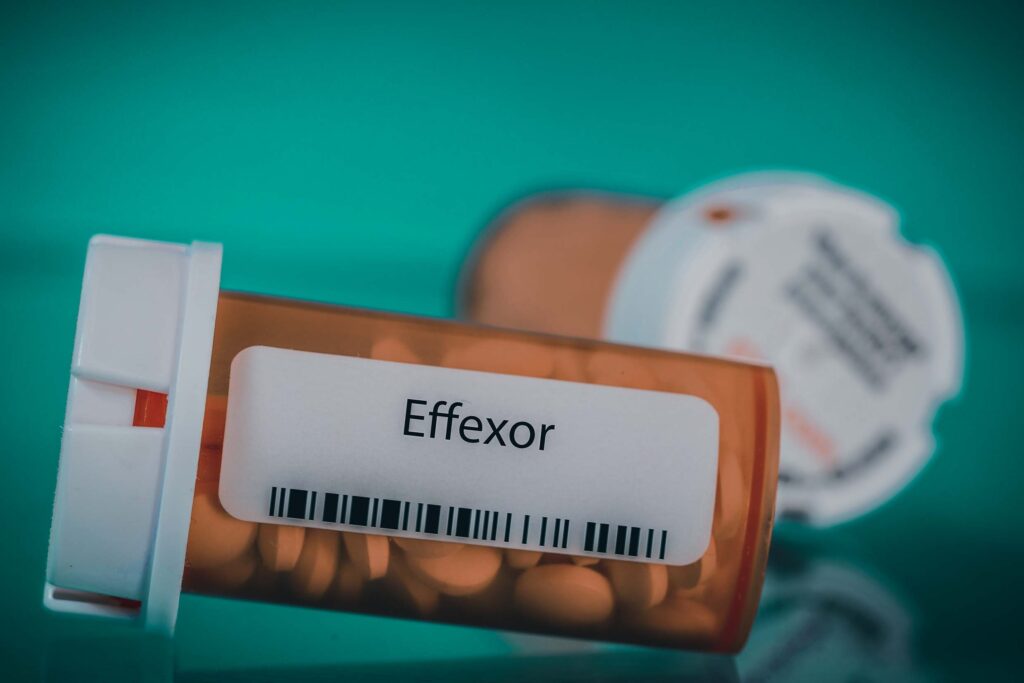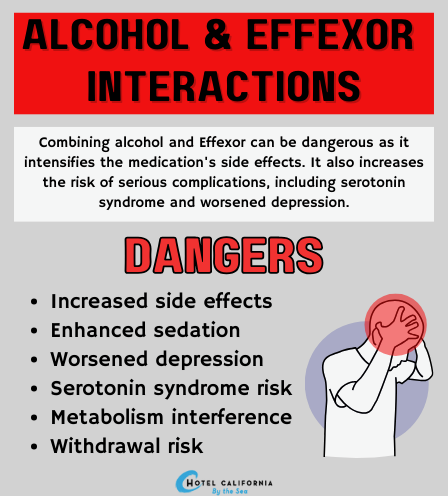The Effects of Effexor and Alcohol
Alcohol and antidepressants do not mix. However, it is often the case that people who suffer from symptoms of mental health disorders and are prescribed antidepressant medications also consume alcohol. Alcohol is used in an attempt to suppress uncomfortable feelings of depression or anxiety. When these two substances are combined, it can result in dangerous adverse effects.

Effexor is the brand name for the generic medication venlafaxine hydrochloride. It is a drug prescribed to treat symptoms of depression and anxiety. Like other antidepressants, Effexor and alcohol are a dangerous combination. Mixing the two puts a person at high risk for drug tolerance, dependence and addiction to either or both Effexor and alcohol.
What is Effexor?
Effexor belongs to a group of medications called selective serotonin and norepinephrine reuptake inhibitors (SNRI). It is prescribed to treat anxiety, manic depression, panic attacks, social anxiety disorder and other psychiatric disorders that can interfere with daily living. It is also prescribed for off-label uses in the treatment of ADHD, PTSD and OCD. Antidepressants such as Effexor are one of the few drugs that cross the blood-brain barrier. The blood-brain barrier is an important protective layer surrounding the brain that keeps harmful bacteria, viruses and other unwanted compounds out. When drugs or medications are able to penetrate through this barrier, they are considered powerful substances that can significantly impact the central nervous system.
Effexor works by increasing levels of serotonin, norepinephrine and dopamine in the brain. Serotonin is located in various parts of the body and enables us to experience feelings of happiness. It also affects sleep and helps to regulate anxiety. In some cases, misuse of Effexor can cause the development of serotonin syndrome. Effects of this dangerous condition include fever, sweating, vomiting, increased heart rate, hallucinations and impaired coordination.
Common side effects of Effexor use include dry mouth, difficulty sleeping, dizziness and headaches. Other rare side effects include anxiety attacks, sudden changes in mood or behavior, increased impulsivity, hostility, confusion, memory loss, sudden weight gain or loss, chest pain and abdominal pain.

How does Effexor work?
The drug works by impacting the chemical balances in the brain by crossing the blood-brain barrier. It increases the amount of serotonin and norepinephrine in the brain. These chemicals are associated with mood regulation and can impact feelings of depression and anxiety.
According to the National Institute of Mental Health, depression is a mood disorder defined by ongoing patterns of feeling empty, sad and down. Depression is impacted by various biological, genetic, psychological and environmental factors. Although the exact cause of depression and anxiety is still unknown, clinical studies have suggested that there is a connection between the availability of chemical neurotransmitters in the brain and the symptoms of mental health disorders.
Researchers believe those who suffer from depression and anxiety have an imbalance of these chemicals available in their brain that causes uncomfortable feelings. Drugs such as Effexor and other antidepressants work by encouraging increased production of these mood-enhancing chemicals to rebalance the brain.
So how does it work on depression? In the brain, neurotransmitters such as serotonin and norepinephrine are little communication messengers sent out from the brain to other areas of the body. Once these chemicals have carried out their message, they are then reabsorbed into the brain in a process called reuptake. When Effexor enters the body, it works by blocking the brain from reabsorbing the chemical messengers allowing for increased amounts of these neurotransmitters to be available for use. This increase leads to an abundance of mood-enhancing chemicals such as serotonin and norepinephrine.
How long does Effexor stay in your system?
Effexor’s half-life is around 5 hours. Effexor begins to work immediately as it enters the body. However, many people do not feel the effects of the medication until after the first or second week. In some cases, it can take up to 4-6 weeks to be fully effective.
This medication is broken down quickly, which also means if the person has become dependent, the onset of withdrawal symptoms is also experienced very quickly. How long it takes for the medication to leave your body is dependent on each patient and various environmental and biological factors. The medication is generally out of your system between 12-24 hours. However, the effects of the medication can remain effective for up to 3 weeks.
Check Your Insurance Coverage for FREE
Find out if your insurance covers addiction treatment in minutes. We accept most insurance!
Effexor and Alcohol
Do not mix Effexor and alcohol. In general, prescription medications such as antidepressants do not mix well with alcohol. Alcohol is a central nervous system depressant that can cause dangerous interactions with Effexor. It can counteract the benefits of the drug and make it more difficult for the medication to work properly and effectively.
Excess alcohol consumption can trigger symptoms of depression and anxiety. While Effexor works to manage these symptoms, the combination of the two drugs can often cause conflicting messages in the brain and lead to harmful CNS effects. Alcohol misuse can cause a decline in cognitive functioning. This can lead to patients forgetting to take their Effexor medication, which then contributes to an increased risk of experiencing withdrawal symptoms. Alcohol is closely linked to symptoms of depression because it slows down neurotransmitter activity in the brain. Effexor works in the opposite and provides more neurotransmitter activity. These conflicting effects from both substances can cause an imbalance and lead to worsen adverse effects.
Adverse effects of mixing Effexor and Alcohol
- Increased drowsiness and dizziness – Alcohol can intensify the sedative effects of Effexor.
- Impaired judgment and coordination – It can further impair cognitive and physical functioning leading to increased risks of accidents and injury.
- Nausea
- Blurred vision
- Gastrointestinal damage
- Liver damage – both substances are metabolized and processed in the liver. The simultaneous intake of both can strain the functions of the liver and lead to inflammation, fatty liver and liver cirrhosis.
- Worsening mental health conditions such as depression and anxiety
- Changes in mood and behavior
- Difficulty concentrating and making decisions
- Memory loss and blackouts
- Reduce attention span
- Diminished inhibitions
- Development or worsening of sleep problems
- Heart complications
- Convulsions
- Hyperventilation
- Higher risk of overdose
Reach out to Hotel California by the Sea
We specialize in treating addiction and other co-occurring disorders, such as PTSD. Our Admissions specialists are available to walk you through the best options for treating your addiction.
Treatment for Polysubstance Addiction
Mixing an antidepressant and alcohol can lead to dangerous side effects. Alcohol can exacerbate the negative effects of the antidepressant medication. Mixing Effexor and alcohol is no exception. The combination of the two drugs can severely impact the user causing sedation, confusion and cognitive impairment. Professional behavior treatment programs such as Hotel California by the Sea provide the tools, resources and support clients need when experiencing polysubstance addiction.
We provide treatment in detox, residential, partial hospitalization program and intensive outpatient programs. We utilize evidence-proven treatment methods such as cognitive behavioral therapy, dialectical behavioral therapy, group therapy and family therapy. The combination of individual and group counseling sessions provides clients with a well-rounded treatment plan. Hotel California by the Sea is dedicated to helping our clients reach their recovery goals and overcome their addictions.
References:
https://khealth.com/learn/antidepressants/effexor-and-alcohol
https://www.mentalhealth.com/library/venlafaxine-uses-dosage-side-effects
https://www.choosingtherapy.com/effexor-and-alcohol/
https://www.destinationsforteens.com/destinations-blog/effexor-alcohol-risks-drinking-effexor
https://www.forhers.com/blog/effexor-and-alcohol
https://my.clevelandclinic.org/health/drugs/20828-venlafaxine-tablets
